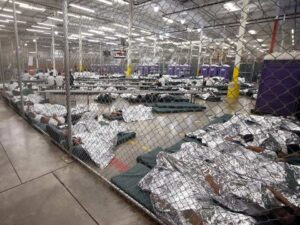by The Cowl Editor on September 5, 2018
National and Global News

by Catherine Brewer ’20
News co-Editor
News of family separations and detention center conditions swept the country during the summer of 2018. Mainstream broadcasting and social media platforms such as Facebook helped make breaking information available to individuals internationally.
With August coming to a close, the unrest continues. The Trump administration made headlines on April 6, 2018 when Attorney General Jeff Sessions announced that the federal government would be implementing a “zero tolerance” policy for immigrants entering the U.S. at the southwestern border. Sessions also called on federal prosecutors to make undocumented immigration a top priority and utilize “the full prosecutorial powers of the Department of Justice,” which would mean criminal prosecution of immigrants. This strays from the typical treatment of immigration policy violations, which are considered misdemeanors.
Criminal prosecution of immigrants was accompanied by family separations at the border due to the federal policy that parents and children cannot reside in federal jail together. While parents were sent to be prosecuted, children were separated by age group and sent to facilities run by the Department of Health and Human Services (HHS) and recategorized as “unaccompanied minors.” Those under age 13 were placed in “tender age” shelters, with many children being under age 5.
In the weeks that followed, political and public uproar pushed back against family separation. All four living former first ladies openly criticized the policy, while Homeland Secretary Kirstjen Nielsen firmly defended the administration, stating that it would not apologize for the implications of its policy. U.S. Customs and Border Protection (CBP) and HHS both released photos of the tender age shelters, and much of the media and public was infuriated to see what was considered “children behind bars.”
On June 18, ProPublica released an eight-minute audio recording of children between the ages of 4 and 10 that was obtained inside a CBP facility. At one point, the recording features a federal agent commenting that the crying sounds “like an orchestra.”
On June 20, President Trump signed an executive order calling for the end of family separations. The order was drafted by Nielsen and specifically calls for keeping families together once they are detained for crossing the border without documentation. CBP reported that over 2,300 children had been separated from their families since May.
Two days later, Trump was joined by over a dozen parents of children who lost their lives to individuals who entered the U.S. without documentation. Trump stated, “these are the families the media ignores…These are the stories that Democrats and people that are weak on immigration, they don’t want to discuss, they don’t want to hear, they don’t want to see, they don’t want to talk about.” However, multiple studies refute the idea that undocumented immigrants pose high criminal threat to the nation
The tension between the two beliefs has escalated in recent days with the death of Mollie Tibbetts, a 20-year-old University of Iowa student who was last seen on a run near her home in Brooklyn, Iowa and was later found dead in a cornfield on August 21. Police reported that 24-year-old Cristhian Bahena Rivera, an undocumented immigrant from Geurrero, Mexico, confessed to the murder, and a spokesperson for U.S. Citizenship and Immigration Services stated that Rivera did not have legal status in the country.
Last Thursday, the Business Roundtable addressed Nielsen in a letter that explained their concerns regarding changes in immigration policy by the Trump administration.
The Roundtable is a group of top CEOs that endorse policies that they believe will stimulate economic growth. It includes the heads of Apple, AT&T, Bank of America, Coca-Cola, IBM, JP Morgan, and Pepsi.
Their primary issues are with changes to the rules and processes for H-1B visas for skilled workers and their spouses, as well as with deportation. They feel that new policies will discourage current and potential employees, and the Labor Department has shown that there are “no qualified U.S. workers are available to do that person’s job.”